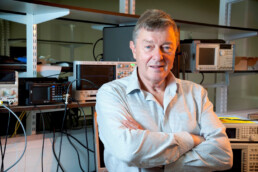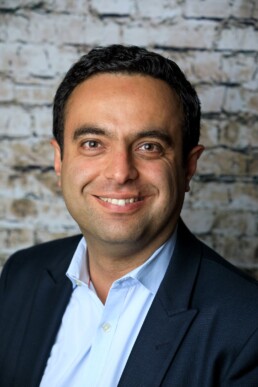City life | By Kasia Derkacz
Exploring new spaces with the London Space Innovation Centre
With space set to become the new internet, The London Space Innovation Centre (LSIC) is on track to go viral.
City’s new centre officially launched in March 2021 and is built on existing capabilities at City, connecting academia, industry and the public sector within a single, interdisciplinary hub.
Comprising of a relatively small team, the centre boasts a wide range of accomplishments since its launch, establishing itself within the space sector and building connections not just within City’s own Schools and departments, but also extending its reach nationally and globally. The centre works in three main areas: education, research and enterprise, and has made significant progress in each of these underpinning pillars.
Developing the UK’s space systems
Since the departure from the European Union, the UK has to develop its own Position, Navigation and Timing (PNT) systems. These systems underpin our infrastructure, from security and defence to digital economy. This is a great opportunity for the UK’s space sector, and LSIC is at the forefront of this pioneering development, working with the Ministry of Defence to conduct research into PNT systems, which help support national amenities pivotal in our daily lives.
Elaborating on the research conducted within the centre, Professor David Stupples says: “This is really important because nearly all of the autonomous vehicles the Ministry of Defence will have will be controlled by navigation from space”. Reinforcing the importance of the UK’s PNT systems launch, Professor Stupples also adds: “If something ever happened to the timing of PNT, even by one millisecond, the banking system and the power network would encounter serious difficulties”.

& Radio Engineering at City’s School of Mathematics, Computer Science & Engineering.
Research beyond boundaries
The centre prides itself on its unique approach to the space industry. While other space centres specialise in one distinct area of research, LSIC focuses on intersectionality and cross-sector collaboration.
Professor Nabil Aouf, one of the centre’s Directors is leading a research consortium which has recently been awarded a highly competitive funding from the European Space Agency (ESA). The project will investigate the development of Artificial Intelligence driven systems for space guidance, navigation and control, with a focus on space autonomy.
Explaining the research undertaken by the consortium, Professor Nabil Aouf highlights: “We have a couple of programmes that we are working on with the UK Space Agency and the European Space Agency for different applications of the projects around Artificial Intelligence in space. More importantly, the big thing is space autonomy, which includes making operations autonomous and/or automatic, without or with minimum human intervention”.
Collaboration across City
The centre has great ambitions to collaborate with other departments and Schools across City and establish expansive networks that dive into the unchartered waters of space, including space finance, law and actuarial science and insurance, which are set to become more prominent with the commercialisation of the space sector and space tourism. LSIC recently partnered with the School of Mathematics, Computer Science & Engineering’s Professional Liaison Unit to hold a virtual careers event to help students explore the range of careers available in the European space sector.
Even the centre’s physical space mirrors this intersectional approach. Without a physical hub to undertake research, the centre collaborates with other existing centres, who collectively contribute to the multidisciplinary space-related research projects. One example is the LSIC’s work with City’s Department of Social Sciences to examine the use of smart technologies and space images in the study of human behaviour.
Supporting City’s students
CubeSat Competition
The Centre provided an opportunity for City’s students from the Robotics and Machine Intelligence Society to participate in a satellite design challenge, the CubeSat Competition 2021. The participants were asked to theoretically design a CubeSat, taking into consideration all aspects of build and launch, with the winning proposal receiving funding to bring a model of the satellite to life. The competition was open to both undergraduate and postgraduate students from across City’s Schools, echoing the interdisciplinary ethos of the centre. Through this competition, the centre hoped to involve City’s students in space-related research and to create a forum for students to learn from experts not only from the centre itself, but also organisations such as the European Space Agency.
Space Launch & Operations Management short course at City
In June 2021, LSIC launched a two-day CPD course designed as a first step in addressing the skills gap in the UK space launch industry. This pioneering course is the first of its kind across the world. With the UK set to develop its own spaceports, the centre considers this as a timely opportunity to become pioneers in the sector and provide existing and aspiring industry professionals with knowledge about spaceports, spaceflight operations, the range and applicable UK Regulations and the licensing process.
The course is led by Dr Andy Quinn, a City alumnus who gained a distinction in his doctoral research on spaceflight safety in 2011 and has since worked across the industry, participating early on with the UK launch aspirations. The course also boasts a wide range of industry-leading speakers from organisations such as the Department for Transport’s Space Team and the UK’s Spaceports.
Ehsan Razavizadeh, the centre’s Managing Director says: “We are in very exciting times within space industrial revolution. The UK is developing spaceports in the country. This will create huge opportunities for the private sector and the CubeSats to be launched from the UK and we think this would be a very important step for us to contribute to the UK space launch capabilities and skills gap”.

Ehsan previously worked at City as the Founding Director and Head of the Dubai campus.
National and global industry networks
London space cluster
LSIC’s central London location unlocks opportunities for collaboration. The centre believes that the City of London will play a big role in the UK’s space aspirations, with commercialisation of space bound to extend to industries such as insurance, finance, banking and professional services.
The centre’s proximity to the City of London goes beyond its physical location. LSIC’s close links are reinforced by its connection to the Lord Mayor of the City of London and City’s Rector, Alderman William Russell, who officially launched the centre at its opening event. Due to this unique positioning, LSIC hopes to achieve its ambitions of creating a leading London space cluster by creating strategic partnerships that will aid with transposing their interdisciplinary framework across different industries.
International networks
The centre has a great international network. As part of the Space Academic Network, the centre is currently working on advising the government on the development of space research in London. This is especially important and timely as much of the research in space is transferred directly to manufacturers, many of whom are European-owned. The centre hopes that through the advisory work they can help ensure that our space research and IP remain in the UK, aiding to expand our space sector.
The centre is also part of the Space University Network, focusing on promoting space within student communities and building a pipeline of new talent to support the UK’s space ambitions.
The centre’s accomplishments within the last months are just the beginning of the bold vision it is set on achieving. Beyond its international networks, LSIC hopes to form relationships with City’s Schools, departments and Alumni Network, believing these partnerships will be at the forefront of space innovation.
Looking to the future, LSIC Director Professor Nabil Aouf says: “We have a lot of ambitions at the national level and at the international level and I am sure we will be able to achieve these objectives”.